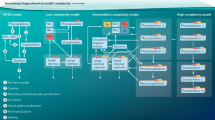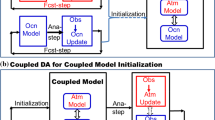Abstract
Physical and biogeochemical ocean dynamics can be intermittent and highly variable, and involve interactions on multiple scales. In general, the oceanic fields, processes and interactions that matter thus vary in time and space. For efficient forecasting, the structures and parameters of models must evolve and respond dynamically to new data injected into the executing prediction system. The conceptual basis of this adaptive modeling and corresponding computational scheme is the subject of this presentation. Specifically, we discuss the process of adaptive modeling for coupled physical and biogeochemical ocean models. The adaptivity is introduced within an interdisciplinary prediction system. Model-data misfits and data assimilation schemes are used to provide feedback from measurements to applications and modify the runtime behavior of the prediction system. Illustrative examples in Massachusetts Bay and Monterey Bay are presented to highlight ongoing progress.
Chapter PDF
Similar content being viewed by others
Keywords
These keywords were added by machine and not by the authors. This process is experimental and the keywords may be updated as the learning algorithm improves.
References
Darema, F., et al.: NSF sponsored workshop on dynamic data driven application systems. Technical report, National Science Foundation (2000), http://www.cise.nsf.gov/cns/darema/dd_das/dd_das_work_shop_rprt.pdf
Robinson, A., Lermusiaux, P.: Data Assimilation in Models. In: Encyclopedia of Ocean Sciences, pp. 623–634. Academic Press Ltd., London, London (2001)
Robinson, A., et al.: Harvard Ocean Prediction System (HOPS) (2001-2004), http://oceans.deas.harvard.edu/HOPS/HOPS.html
Stammer, D., Rizzoli, P., Carton, J., Cummings, J., Lermusiaux, P., Moore, A.: A U.S. plan for sustained data assimilation in ocean research (2004), http://www.atmos.umd.edu/~carton/dameeting
Lermusiaux, P., Robinson, A., Haley, P., Leslie, W.: Advanced interdisciplinary data assimilation: Filtering and smoothing via Error Subspace Statistical Estimation. In: The OCEANS 2002 MTS/IEEE, pp. 795–802. Holland Publications (2002)
Evangelinos, C., Chang, R., Lermusiaux, P., Patrikalakis, N.: Rapid real-time interdisciplinary ocean forecasting using adaptive sampling and adaptive modeling and legacy codes: Component encapsulation using XML. In: Sloot, P.M.A., Abramson, D., Bogdanov, A.V., Gorbachev, Y.E., Dongarra, J., Zomaya, A.Y. (eds.) ICCS 2003. LNCS, vol. 2660, pp. 375–384. Springer, Heidelberg (2003)
Besiktepe, S., Lermusiaux, P., Robinson, A.: Coupled physical and biochemical data driven simulations of Massachusetts Bay in late summer: real-time and post-cruise data assimilation. J. of Marine Systems 40, 171–212 (2003), Gregoire, M., Brasseur, P., Lermusiaux, P.F.J. (eds.)
Larson, J.W., Jacob, R.L., Foster, I., Guo, J.: The Model Coupling Toolkit. Technical Report ANL/CGC-007-0401, Argonne National Laboratory (2001)
Tian, R., Lermusiaux, P., McCarthy, J., Robinson, A.: The Harvard generalized biogeochemical ocean model. Technical report, Harvard University DEAS (2004)
Author information
Authors and Affiliations
Editor information
Editors and Affiliations
Rights and permissions
Copyright information
© 2004 Springer-Verlag Berlin Heidelberg
About this paper
Cite this paper
Lermusiaux, P.F.J. et al. (2004). Adaptive Coupled Physical and Biogeochemical Ocean Predictions: A Conceptual Basis. In: Bubak, M., van Albada, G.D., Sloot, P.M.A., Dongarra, J. (eds) Computational Science - ICCS 2004. ICCS 2004. Lecture Notes in Computer Science, vol 3038. Springer, Berlin, Heidelberg. https://doi.org/10.1007/978-3-540-24688-6_89
Download citation
DOI: https://doi.org/10.1007/978-3-540-24688-6_89
Publisher Name: Springer, Berlin, Heidelberg
Print ISBN: 978-3-540-22116-6
Online ISBN: 978-3-540-24688-6
eBook Packages: Springer Book Archive




